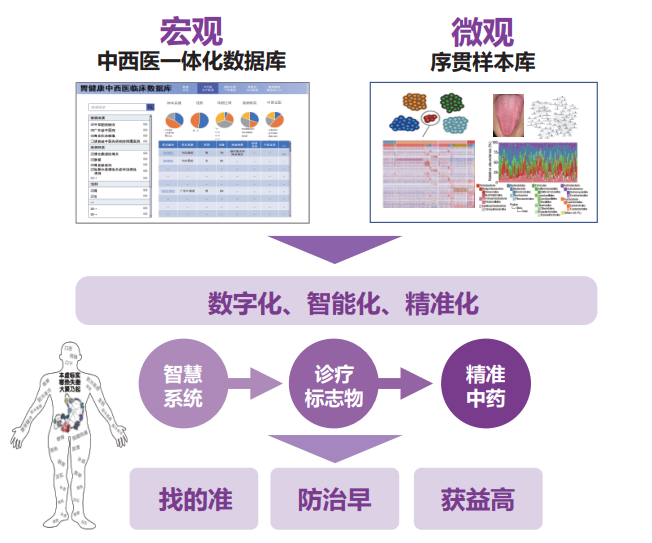
Precision medicine holds immense promise in revolutionizing cancer treatment and prevention within the framework of traditional Chinese medicine (TCM). In TCM, the prescription of drugs is formulated as individualized remedies based on comprehensive assessments of the patient's health using TCM diagnostic techniques. By analyzing factors such as tongue and pulse diagnosis, TCM practitioners gain a deeper understanding of the patient's underlying imbalances and overall constitution. This personalized approach allows for a more precise and targeted treatment strategy, considering not only the symptoms but also the root causes of the disease.
To enhance the efficacy of TCM in cancer treatment and prevention, our researchers are actively exploring the scientific mechanisms of action behind TCM formulae. By understanding the intricate interactions of bioactive compounds within TCM herbs, they can identify specific components that exhibit anti-cancer properties. This knowledge serves as the basis for the development of new TCM drugs that can be harnessed to combat cancer effectively.
In cancer prevention, precision medicine in TCM adopts a proactive approach. By analyzing a person's constitution and potential risk factors through TCM diagnostic techniques, our researchers strive to identify individuals who may be predisposed to developing certain types of cancer.
Additionally, the integration of scientific understanding into TCM fosters the standardization of TCM products used in cancer treatment and prevention. Standardization ensures consistent quality and potency, which are essential for reliable therapeutic outcomes. By adhering to rigorous quality control measures, TCM products can gain wider acceptance and integration into modern cancer treatment protocols, complementing conventional therapies.
Related articles:
· Zhang P, Wang B, Li S*. Network-based cancer precision prevention with artificial intelligence and multi-omics. Science Bulletin, 2023; S2095-9273(23)00342-0
https://doi.org/10.1016/j.scib.2023.05.023
· Hou S, Zhang P, Yang K, Wang L, Ma C, Li Y, Li S*. Decoding multilevel relationships with the human tissue-cell-molecule network. Briefings in Bioinformatics 2022; bbac170
https://doi.org/10.1093/bib/bbac170
· Zhang P, Yang M, Zhang Y, Xiao S, Lai X, Tan A, Du S, Li S*. Dissecting the single-cell transcriptome network underlying gastric premalignant lesions and early gastric cancer. Cell Reports 2019; 27,1934-1947
· https://doi.org/10.1016/j.celrep.2019.04.052
· Cui J, Cui H, Yang M, Du S, Li J, Li Y, Liu L, Zhang X*, Li S*. Tongue coating microbiome as a potential biomarker for gastritis including precancerous cascade. Protein & Cell 2019;10: 496-509.
https://doi.org/10.1007/s13238-018-0596-6
· Zhang P, Yang M, Zhang Y, et al. A comprehensive analysis of single-cell transcriptome network underlying gastric premalignant lesions and early gastric cancer. bioRxiv; 2018.